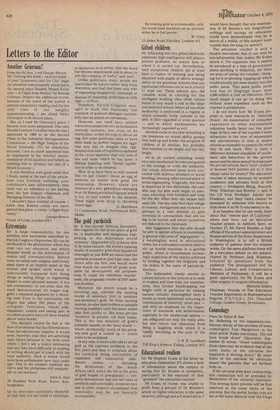Gifted children
Sir: Educating the very gifted child with extremely high intelligence will always present problems, no matter how or where it is carried out. Nevertheless, such exceptional children did at least have a chance of meeting and being educated with pupils of above average ability in the grammar schools that our egalitarian reformers are in such a hurry to wipe out. These schools also did valuable work in catering for the intelligent working class child, whose future is very much a risk in the large non-selective school, where all too often mediocrity is enthroned in a regime in which acamedic work, suitable to the able, is little regarded or even spurned — and in which examinations are increasingly regarded as evil.
Another curse in the new schooling is the insistence on mixed ability groups that hold up and hinder the progress of children of all abilities, but probably bear heaviest on the bright and the very bright.
All in all, current schooling seems very anti-intellectual in tone and geared to the average or even the mediocre. Our trendy reformers seem more concerned with dubious attempts at social levelling; learning takes second place to social engineering. Tragically, the result is disastrous in two directions: the very able and the able soon begin to associate schooling with boredom and long for the day when they can escape into adult life. The less able find their' refuge in truancy, hooliganism and violence — perhaps in a vain attempt to gain attention in communities that are too big to be human and where incentives are reduced to the minimum.
Any suggestion that the able should be sent to special schools is immediately greeted with cries of "segregation" — a meaningless word in educational terms, but a convenient emotive label to stir up hostile reactions in a gullible public, which is nevertheless increasingly suspicious of the results achieved by herding together the brightest and the dullest in the name of pseudo-democracy.
The fashionable trendy answer to current failures in the schools is to seek to weaken and then wipe out examinations, thus further handicapping the bright child in particular by making success virtually meaningless! Only a return to more specialised schooling in communities of relatively small size — and with an emphasis on the importance of standards and achievement, especially in the intellectual sphere — can safeguard not only the really able, but also rescue our education from being a laughing stock which it is rapidly becoming in the eyes of the world.
J. H. K. Lockhart 21B King's Avenue, Ealing, London W5


































 Previous page
Previous page